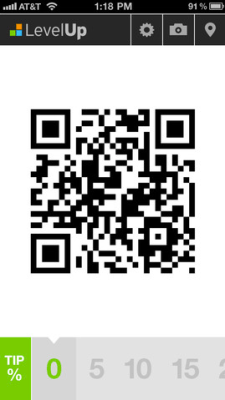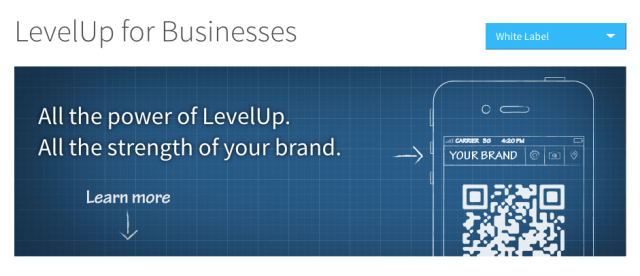In spite of the fact that we now use smartphones to do just about everything, a winner has yet to emerge in the mobile payments space. Unlike mobile photo and video, consumers have yet to get fully comfortable with the idea of turning their phone into a mobile wallet. However, considering that just about every carrier, credit card company and software giant (like Google) is in the process of developing its own mobile wallet, it seems to be a matter of when, not if.
In this fragmented and crowded market, LevelUp, the Boston-based mobile payment startup, is looking to position itself in such a way that it can survive no matter what system or technology wins out in the end, whether it be QR codes or NFC. To do that, the startup is attempting to remove the barriers that prevent consumers from using their phones to make purchases from local merchants — by offering a solution that is payment agnostic.
This fall, LevelUp began rolling out new point-of-sale hardware that supports NFC payments and eliminated the transaction or “swipe” fees that cost merchants $50 billion each year in an effort to reduce friction on both the consumer and merchant side. And, for far, it’s been working.
LevelUp founder Seth Priebatsch tells us that, today, the startup has officially crossed the one million user milestone and now has over 5,000 merchants on board. The startup has processed “nearly $50 million” in mobile payments to date and now has partnerships in place with over 20 point-of-sale companies, which puts it in favorable standing compared to its competitors.
With merchant adoption being critical to LevelUp’s long-term success, along the way, the startup recognized that if it were going to incentivize larger merchants to use LevelUp, it would need to provide them with a way to integrate its technology into their existing apps. In September, the startup launched a while label tool for businesses, which allows them to maintain their own branded apps, while still being able to take advantage of the quick deployment and loyalty infrastructure offered by LevelUp.
Sweetgreen, the first white-label app to launch on LevelUp, debuted at #7 in the Food Category in the App Store, Priebatsch says, and has quickly become “the second most popular payment type at their locations, just behind Visa.” Users can expect many more of these types of LevelUp white-label integrations with big-name merchants in the very near future, he added.
While LevelUp is beginning to find traction after intense focus on developing national distribution with local merchants and white-label functionality, to continue scaling, the founder says, “we need everyone in the payments space to be able to innovate with us and help propel mobile payments forward.” To do that, Priebatsch wants to help LevelUp transition from a product into a platform by way of public APIs and by offering an SDK for its white-label solution.
The idea is for LevelUp to eventually be able to power and feed a variety of apps, becoming the hub or platform around which the apps using its mobile payment technology revolve — in other words, through its APIs, to do for “the mobile payments layer” what Facebook did for the social layer, he says.
The startup is currently in the process of putting the last coat of paint on its API and SDK, which the founder expects to be live by next Monday. Through these tools, merchants will be able offer consumers their own mobile payment app that can be tailored to that particular business, while running on LevelUp’s core platform. In turn, POS players will be able to provide merchants with a solution that gives them updates that “keep pace with rapidly evolving payment technology,” he says.
Furthermore, online food ordering apps, for example, should be able to accept LevelUp as a method of payment, so their restaurants can easily reward customers, whether they pay for the food online or in-store. And, most importantly, the goal is to enable app developers to take the startup’s SDK and integrate it into their own apps or extend LevelUp’s functionality. As an example, Priebatsch sees this working well for fitness apps, which could reward users for hitting personal bests during their daily exercise routines by giving them LevelUp credit to a nearby health food store.
After all, as Paul Graham has said, APIs essentially serve as instant, self-serve business development tools for startups. LevelUp hopes that by encouraging developers to build its payment system into their apps or by giving local merchants the ability to integrate LevelUp into existing apps, it can reach a wider audience and scale effectively to a degree it wouldn’t be able to hit otherwise.
To break down the difference between LevelUp’s API and SDK, just in case it’s not clear — LevelUp’s API will open up the startup’s transactional services to developers, allowing them to use the API to log users in with LevelUp, complete orders, refunds, grab data, claim campaigns and so on.
The SDK, on the other hand, refers to the app-side codebase LevelUp is making accessible to the masses, which the founder describes as essentially “the un-skinned version of LevelUp for iOS and Android.”
Opting for the eat-your-own-dog-food approach, the LevelUp app now runs on its own SDK, Priebatsch tells us, and allows developers to take the core base of the app, skin it to look however they want, add features and modify — or just integrate it into their existing apps. “We like to think of it as a starter kit for anything to do with mobile payments,” he says.
Instant, self-serve business development? Time will tell, but it seems like a good start.
For more, find LevelUp at home here.

